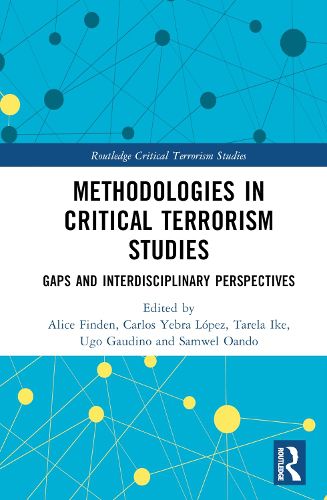Readings Newsletter
Become a Readings Member to make your shopping experience even easier.
Sign in or sign up for free!
You’re not far away from qualifying for FREE standard shipping within Australia
You’ve qualified for FREE standard shipping within Australia
The cart is loading…






This interdisciplinary book presents an intervention into methodological practices in the subfield of Critical Terrorism Studies, and features established and early career scholars.
The volume interrogates the role that research methods play in shaping the sub-discipline of Critical Terrorism Studies (CTS). It responds to two major methodological gaps within CTS: (1) the dearth of Global South cases and voices, and decolonial and feminist approaches; and (2) the lack of engagement with 'traditional' disciplines and quantitative methods. Together, authors demonstrate that interdisciplinary methodological dialogues can open up new possibilities for researchers seeking pathways towards and definitions of emancipation, social justice and freedom from violence. Simultaneously, the book shows that by focusing on the possibilities that methodologies open up to us and by maintaining a commitment to reflexive practice, we expand our understandings of what are 'legitimate' and 'acceptable' forms of research, thus challenging the Critical/Terrorism Studies divide. The chapters draw upon a wide range of empirical cases, including Nigeria, Kenya, France, Brazil and the UK, focusing on three key issues within Critical Terrorism Studies: its own relationship with and perpetuation of epistemic violence; decolonial, postcolonial, Global South, feminist and queer approaches; and more 'traditional' approaches and methods as a means to interrogate the methodological binary between Critical Terrorism Studies and Terrorism Studies.
This book will be of much interest to students of critical terrorism studies, counter-terrorism, security studies and International Relations in general.
$9.00 standard shipping within Australia
FREE standard shipping within Australia for orders over $100.00
Express & International shipping calculated at checkout
This interdisciplinary book presents an intervention into methodological practices in the subfield of Critical Terrorism Studies, and features established and early career scholars.
The volume interrogates the role that research methods play in shaping the sub-discipline of Critical Terrorism Studies (CTS). It responds to two major methodological gaps within CTS: (1) the dearth of Global South cases and voices, and decolonial and feminist approaches; and (2) the lack of engagement with 'traditional' disciplines and quantitative methods. Together, authors demonstrate that interdisciplinary methodological dialogues can open up new possibilities for researchers seeking pathways towards and definitions of emancipation, social justice and freedom from violence. Simultaneously, the book shows that by focusing on the possibilities that methodologies open up to us and by maintaining a commitment to reflexive practice, we expand our understandings of what are 'legitimate' and 'acceptable' forms of research, thus challenging the Critical/Terrorism Studies divide. The chapters draw upon a wide range of empirical cases, including Nigeria, Kenya, France, Brazil and the UK, focusing on three key issues within Critical Terrorism Studies: its own relationship with and perpetuation of epistemic violence; decolonial, postcolonial, Global South, feminist and queer approaches; and more 'traditional' approaches and methods as a means to interrogate the methodological binary between Critical Terrorism Studies and Terrorism Studies.
This book will be of much interest to students of critical terrorism studies, counter-terrorism, security studies and International Relations in general.